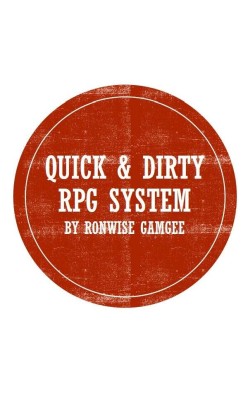Quick & Dirty Character Sheets and Setting Profile
 |
No game using the Quick & Dirty RPG System is complete without the character sheets to go along with it!
Despite the simplicity of the sheet itself¸ the character sheet provides a comprehensive profile where you can infer a lot of information regarding your character's background¸ their areas of expertise¸ their ties to the setting¸ a glimpse into their personality¸ and their overall effectiveness and importance.
If your character has special powers¸ racial traits¸ influential connections¸ or whatever else makes them noteworthy that is not inferred from the main sheet¸ that's where you can make use of the auxiliary sheet¸ which can also be used to make note of conditions they may undergo in the narrative.
While some campaigns may not call for character change or advancement¸ others may¸ and that's where the character change and growth sheet comes into play. Rather than simply jotting down experience points¸ you actually make a note of key events that occur during gameplay¸ which serve as a catalyst to character change or growth. It's character advancement that makes sense.
Have only one copy of Quick & Dirty but you want to quickly show the players the core fundamentals of the system? That's where the reference sheet comes in handy¸ as it instructs the players on when to roll dice¸ what dice ratings mean¸ why they roll dice¸ how dice pools are formed¸ and how to determine the results of dice rolls. The less time is used to flip through rules¸ the more time the group can focus on the game.
Last but not least¸ there is the setting profile. With the setting profile¸ the group has a template to quickly put together a broad-strokes setting to provide narrative context for character creation¸ as well as a quest starter to get the group right into the action.
Leave the baggage at the door and get to the good stuff in your roleplaying games with the Quick & Dirty Character Sheets and Setting Profile!
No game using the Quick & Dirty RPG System is complete without the character sheets to go along with it! Despite the simplicity of the sheet itself¸ the character sheet provides a comprehensive profile where you can infer a lot of information regarding your character's background¸ their areas of expertise¸ their ties to the setting¸ a glimpse into their personality¸ and their overall effectiveness and importance. If your character has special powers¸ racial traits¸ influential connections¸ or whatever else makes them noteworthy that is not inferred from the main sheet¸ that's where you can make use of the auxiliary sheet¸ which can also be used to make note of conditions they may undergo in the narrative. While some campaigns may not call for character change or advancement¸ others may¸ and that's where the character change and growth sheet comes into play. Rather than simply jotting down experience points¸ you actually make a note of key events that occur during gameplay¸ which serve as a catalyst to character change or growth. It's character advancement that makes sense. Have only one copy of Quick & Dirty but you want to quickly show the players the core fundamentals of the system? That's where the reference sheet comes in handy¸ as it instructs the players on when to roll dice¸ what dice ratings mean¸ why they roll dice¸ how dice pools are formed¸ and how to determine the results of dice rolls. The less time is used to flip through rules¸ the more time the group can focus on the game. Last but not least¸ there is the setting profile. With the setting profile¸ the group has a template to quickly put together a broad-strokes setting to provide narrative context for character creation¸ as well as a quest starter to get the group right into the action. Leave the baggage at the door and get to the good stuff in your roleplaying games with the Quick & Dirty Character Sheets and Setting Profile!
No game using the Quick & Dirty RPG System is complete without the character sheets to go along with it!
Despite the simplicity of the sheet itself¸ the character sheet provides a comprehensive profile where you can infer a lot of information regarding your character's background¸ their areas of expertise¸ their ties to the setting¸ a glimpse into their personality¸ and their overall effectiveness and importance.
If your character has special powers¸ racial traits¸ influential connections¸ or whatever else makes them noteworthy that is not inferred from the main sheet¸ that's where you can make use of the auxiliary sheet¸ which can also be used to make note of conditions they may undergo in the narrative.
While some campaigns may not call for character change or advancement¸ others may¸ and that's where the character change and growth sheet comes into play. Rather than simply jotting down experience points¸ you actually make a note of key events that occur during gameplay¸ which serve as a catalyst to character change or growth. It's character advancement that makes sense.
Have only one copy of Quick & Dirty but you want to quickly show the players the core fundamentals of the system? That's where the reference sheet comes in handy¸ as it instructs the players on when to roll dice¸ what dice ratings mean¸ why they roll dice¸ how dice pools are formed¸ and how to determine the results of dice rolls. The less time is used to flip through rules¸ the more time the group can focus on the game.
Last but not least¸ there is the setting profile. With the setting profile¸ the group has a template to quickly put together a broad-strokes setting to provide narrative context for character creation¸ as well as a quest starter to get the group right into the action.
Leave the baggage at the door and get to the good stuff in your roleplaying games with the Quick & Dirty Character Sheets and Setting Profile!